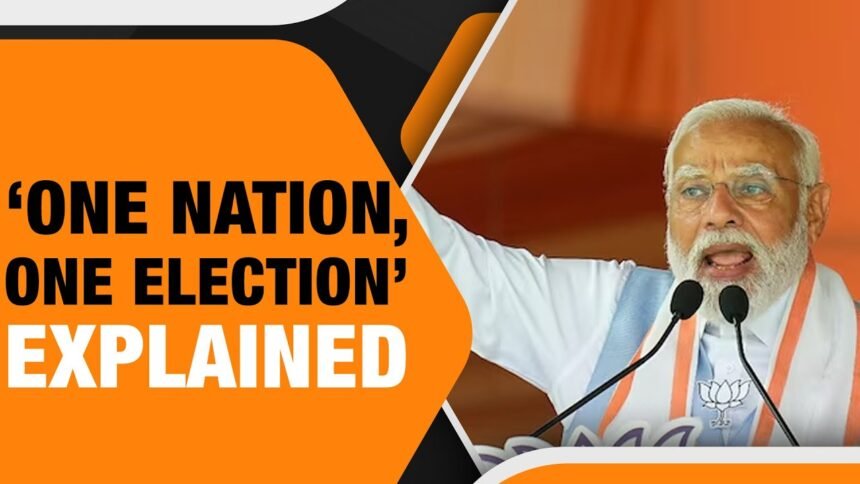The Indian political landscape is gearing up for a significant transformation with the Union Cabinet’s recent approval of the “One Nation, One Election” proposal. This ambitious plan aims to synchronize elections for both the Lok Sabha and state Assemblies, potentially reshaping the way elections are conducted across the country.
The Background: What Sparked This Move?
In March, a high-level committee led by former President Ram Nath Kovind presented a detailed report advocating for simultaneous elections. This proposal is not just about convenience; it’s a strategic overhaul designed to streamline the electoral process. The idea behind this is to minimize the frequency of elections, which have traditionally been spread out over several years.
Why Simultaneous Elections?
India’s current electoral system involves staggere elections at various levels of governance. This means that different elections are held at different times, causing frequent disruptions in governance and significant financial and administrative burdens. By aligning Lok Sabha and state Assembly elections, the government hopes to reduce these costs and administrative complexities.
The Plan Unveiled: What’s Involve?
The proposal includes a comprehensive roadmap for implementing simultaneous elections. The first phase involves conducting concurrent elections for the Lok Sabha and state Assemblies. Following this, there will be synchronize local body elections within a 100-day period. This approach is design to bring about a more organize and cost-effective electoral process.
A Cost-Saving Measure?
One of the key arguments for the “One Nation, One Election” plan is its potential to save costs. Frequent elections mean frequent expenditure on organizing, managing, and overseeing the electoral process. By reducing the number of elections, the government anticipates significant savings, which could be redirect towards other developmental projects.
Political Implications: BJP’s Commitment
The ruling Bharatiya Janata Party (BJP) has championed this policy as a major commitment in its manifesto for the 2024 general elections. For the BJP, this is not just a policy but a promise to streamline and modernize the electoral process. However, the reception from other political parties remains to seen.
Opposition and Challenges
Not everyone is on board with the “One Nation, One Election” proposal. Critics argue that such a drastic change might undermine democratic principles. Elections, they say, need to be held as require to ensure the health of a democracy. The debate around this proposal reflects broader concerns about maintaining democratic integrity while seeking efficiency.
Legal and Constitutional Changes: What’s Need?
To implement this proposal, significant legal and constitutional changes are require. The committee has recommended up to 18 constitutional amendments. While most of these amendments might not need state Assembly ratification, some will require approval from Parliament. Notably, changes related to a single electoral roll and voter ID cards would need ratification from at least half of the states.
The Law Commission’s Role
The Law Commission of India is expect to release its own report on the “One Nation, One Election” plan soon. This report will likely provide further insights and recommendations on how to navigate the legal and logistical challenges involved in this ambitious proposal.
Potential Benefits: A Unified Electoral Process
Proponents of the plan argue that a unified electoral process could bring several benefits. For one, it could lead to more stable governance by reducing the interruptions caused by frequent elections. Additionally, a single election cycle might lead to better voter turnout and more coherent policy implementation.
Public Opinion: What Do Citizens Think?
Public opinion on the “One Nation, One Election” proposal is mix. While some citizens support the idea of reducing the frequency of elections and associated costs, others are concerned about the potential implications for democratic practices. As the debate continues, it will be crucial to gauge public sentiment and address any concerns that arise.
Looking Ahead: What’s Next?
As the proposal moves forward, the coming months will be critical. The implementation will depend on various factors, including legislative approval, legal hurdles, and the response from different political and public stakeholders. The path forward will require careful planning and broad consensus to ensure the successful realization of this significant electoral reform.
Read More: What Is Research Philosophy and Why Does It Matter
Conclusion
The “One Nation, One Election” proposal represents a bold step towards reforming India’s electoral process. While it promises potential benefits such as cost savings and streamlined governance, it also raises important questions about democratic integrity and practical implementation. As the country navigates this complex issue, the ultimate success of the plan will depend on balancing efficiency with democratic principles.










